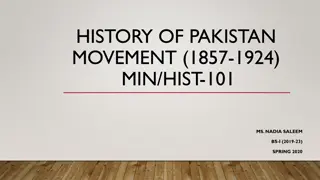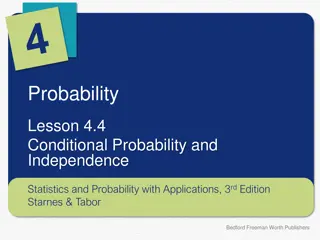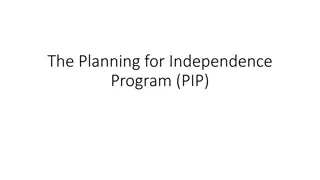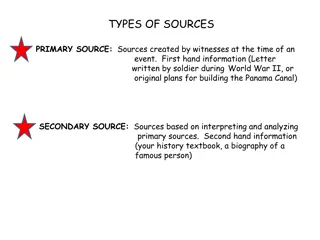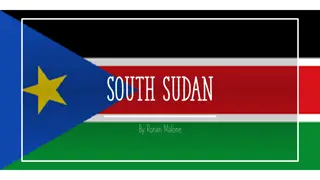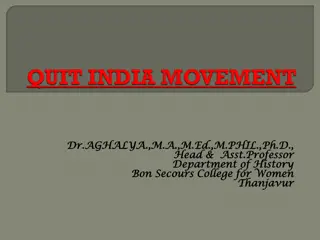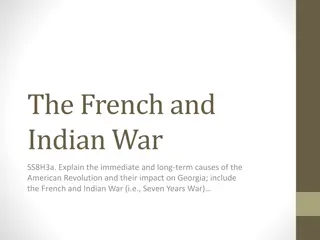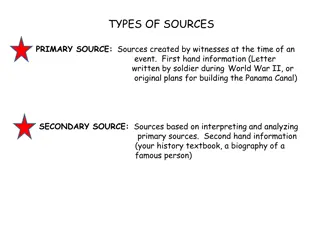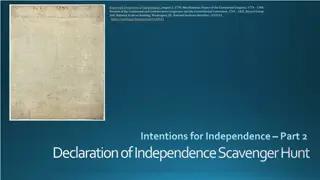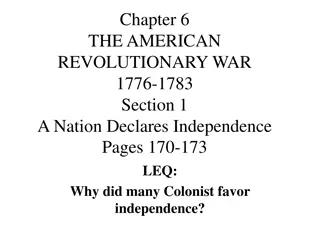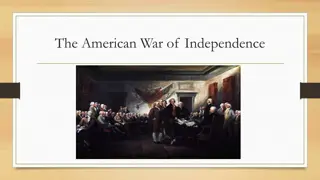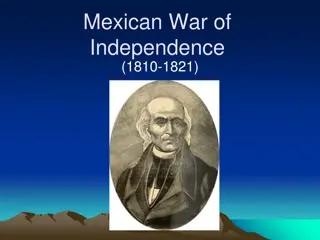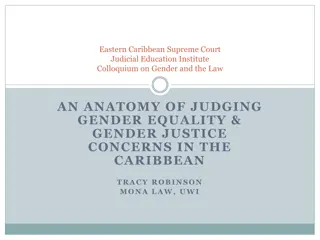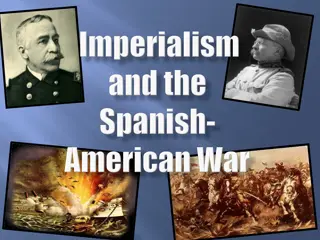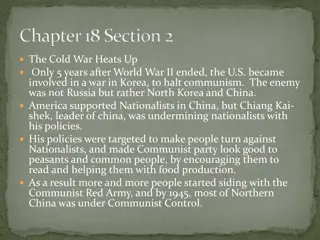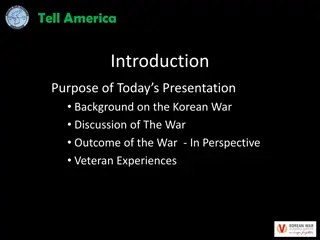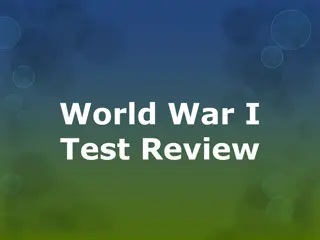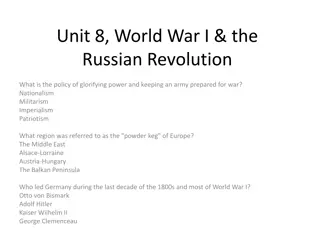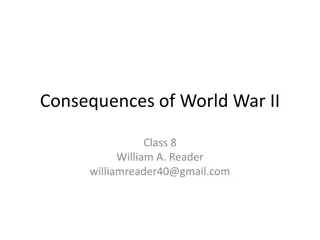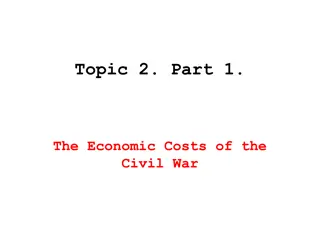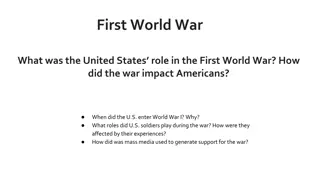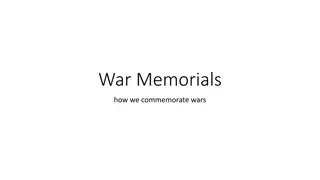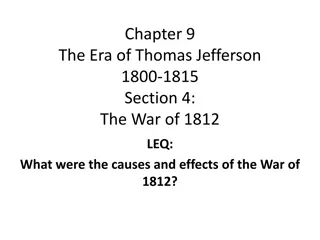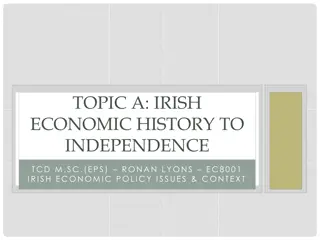❤[PDF]⚡ Civil War Talks: Further Reminiscences of George S. Bernard and His Fel
\"COPY LINK HERE ; https:\/\/getpdf.readbooks.link\/0813931754\n\nRead ebook [PDF] Civil War Talks: Further Reminiscences of George S. Bernard and His Fellow Veterans (A Nation Divided: Studies in the Civil War Era) | Civil War Talks: Further Reminiscences of George S. Bernard and His Fellow Vetera
1 views • 6 slides
Ireland's Engagement with the League of Nations: Path to Independence
Ireland's entry into the League of Nations in 1923 marked a significant step towards independence after the War of Independence and Civil War. Through joining the League and asserting its independence, Ireland demonstrated its readiness to participate in global initiatives for peace and cooperation.
4 views • 17 slides
The Homefront: U.S. War Production Efforts During World War II
During World War II, the United States mobilized its industries for total war production, converting peacetime factories into facilities for producing planes, tanks, rifles, and more. The U.S. became the Allies' biggest armaments supplier, producing millions of war supplies and significantly boostin
2 views • 25 slides
War of Independence 1857: Causes, Impact, and Failure
The War of Independence in 1857 was a pivotal moment in the history of the Indian subcontinent, fought against British domination. Despite efforts by Indians, including issues of conflict and lack of leadership, the war ultimately failed due to various political, social, religious, military, and eco
0 views • 22 slides
Evolution of the Indian Financial System: A Historical Perspective
The Indian Financial System has evolved through distinct phases - Pre-Independence, Post-Independence up to 1991, and post-1991. Pre-Independence saw a closed economy with limited access to foreign savings. Post-Independence witnessed significant growth, nationalization of banks and insurance, devel
0 views • 20 slides
Understanding Conditional Probability and Independence in Statistics
Conditional probability and independence are essential concepts in statistics. This lesson covers how to find and interpret conditional probabilities using two-way tables, calculate probabilities using the conditional probability formula, and determine the independence of events. Through examples li
0 views • 15 slides
Origins of the Cold War: Yalta and Potsdam Conferences 1945
The Cold War's origins stem from the tensions and suspicions between the USSR and the West post-World War II, highlighted through conferences like Yalta and Potsdam. At the Yalta Conference, held in February 1945, crucial decisions were made regarding Germany, Poland, and the UN. The Potsdam Confere
0 views • 10 slides
Best Practices for Independence in Implementing FASB ASC 606
Independence considerations are crucial when assisting attest clients with FASB ASC 606 implementation. General requirements and dos and don'ts must be followed to maintain independence. Factors to assess independence include client responsibility, training provided, and extent of involvement. Audit
0 views • 6 slides
Planning for Independence Program (PIP) - Empowering Students for Success
Our Planning for Independence Program (PIP) offers a 7-year alternative program to students with Intellectual Developmental Exceptionality. Through individualized education programs, students develop necessary skills for independence, including transit training, social skills, literacy, and numeracy
0 views • 9 slides
American History: Sources, Dates, and Declarations
Explore the types of sources in history, significant dates from the Declaration of Independence to Obama's presidency, and key periods in American history post-Civil War. Delve into primary and secondary sources, pivotal events like World War II and the Cold War, and the profound impact of historica
0 views • 16 slides
Insights into World War Two and Adolf Hitler's Role
World War Two started on September 3, 1939, with Britain and France declaring war on Germany. Adolf Hitler's rise to power, initiation of the war, and involvement in the Holocaust are highlighted. The Star of David symbolized Jewish identity under Hitler's rule, and the Holocaust saw six million Eur
0 views • 6 slides
Discovering South Sudan: Independence, Height, Civil War, and More
South Sudan, a relatively new country since gaining independence from Sudan in 2011, has a unique blend of facts ranging from being taller than average to enduring a prolonged civil war. Learn about its capital city Juba, the impactful South Sudanese civil war, and intriguing fun facts about the nat
0 views • 8 slides
John H. Chafee Foster Care Independence Program (CFCIP) Overview
The John H. Chafee Foster Care Independence Program (CFCIP) is a federal initiative established under the Foster Care Independence Act of 1999 to support youth transitioning out of foster care. It provides various services such as job training, housing assistance, education support, and financial ai
0 views • 10 slides
The Quit India Movement: A Pivotal Moment in India's Independence Struggle
The Quit India Movement, also known as the India August Movement, was a key event in India's fight for independence led by Mahatma Gandhi in 1942. This movement urged the British to grant India independence through peaceful non-violent protests. It called for an immediate end to British rule, the fo
0 views • 15 slides
Causes and Impact of the French and Indian War on the American Revolution
The French and Indian War was caused by disputes over land and power between France and Great Britain, leading to a nine-year conflict that began in 1754. Tensions escalated as both countries claimed the Ohio River Valley, a key frontier region. The war had significant immediate and long-term impact
0 views • 17 slides
Important Milestones in American History and Sources of Information
This content provides a comprehensive overview of different types of historical sources, crucial dates in American history, significant time periods post-Civil War, and key historical documents like the Declaration of Independence. It distinguishes between primary and secondary sources, lists import
0 views • 11 slides
Declaration of Independence Scavenger Hunt and Discussion
Explore clues and discussions surrounding the Declaration of Independence in this engaging scavenger hunt. Discover insights into the authors' identities, the document's intended audience, grievances, and evidence supporting independence. Delve into a thought-provoking discussion on the justificatio
0 views • 8 slides
The American Revolution: Pursuit of Independence
The American Revolutionary War of 1776-1783 marked a significant turning point in history as colonists sought independence from British rule. The support for independence was fueled by figures like Thomas Paine and pivotal documents such as the Declaration of Independence. The divide among colonists
0 views • 20 slides
Causes and Reactions of the American War of Independence
The American War of Independence was fueled by various causes, including taxation without representation, economic restrictions on trade imposed by Britain, and defiance through protests like the Boston Tea Party. The colonies fought for their independence, culminating in the Declaration of Independ
0 views • 4 slides
Mexican War of Independence (1810-1821): A Historical Journey
The Mexican War of Independence (1810-1821) was a tumultuous period marked by leaders like Miguel Hidalgo and Jose Morelos who fought against Spanish rule in Mexico. Despite setbacks, the struggle for independence persisted, eventually culminating in the declaration of Mexico's independence and the
0 views • 10 slides
Analysis of W.B. Yeats' Poetry During World War I
W.B. Yeats' poetry during World War I reflects a unique perspective on the conflict, as seen in works like "An Irish Airman Foresees His Death" and "On Being Asked for a War Poem." Delving into themes of sacrifice, duty, and the futility of war, Yeats offers a contrasting view to the graphic realism
0 views • 7 slides
Understand Paragraph Writing: War of Independence Lesson
Learn about writing paragraphs through the lens of the War of Independence. Discover the structure of a paragraph, its components, and delve into the historical context of Bangladesh's struggle for independence. Enhance your writing skills and grasp the significance of organizing thoughts effectivel
0 views • 21 slides
Timeline of Key Events Leading to World War II
In the years leading up to World War II, a series of significant events unfolded in Europe. From Hitler's demands and annexations to the signing of pacts and the invasion of Poland, tensions escalated rapidly. The Munich Agreement, German offensive in Poland, declaration of war by France and Britain
0 views • 12 slides
Gender Equality and Judicial Independence in the Caribbean
This content explores the role of judges in promoting gender equality and justice in the Caribbean region, discussing preliminary points, judicial independence, and the rule of law. It emphasizes the importance of judges maintaining professional competence and independence to address gender equality
0 views • 30 slides
The Impact of the Korean War on Global Relations
The Korean War, often dubbed the "Forgotten War," had significant implications on global politics and relationships. This conflict was characterized by a mix of conventional and guerilla warfare tactics. China's involvement in the war had a profound impact on its relations with the U.S. and the U.S.
0 views • 14 slides
The Spanish-American War: Origins and Impact
The Spanish-American War was fueled by a combination of factors including economic struggles, imperial ambitions, and sensationalist journalism. Theodore Roosevelt's stance on war, coupled with the desire for Cuba's independence from Spain, led to a call for war in the late 1890s. Yellow journalism
0 views • 18 slides
The Cold War Heats Up: Korea and China Conflict
The post-World War II era saw the U.S. engaging in the Korean War to combat communism, facing off against North Korea and China instead of Russia. Conflict in China between the Nationalists led by Chiang Kai-shek and the Communists under Mao Tse-tung intensified, with Chiang's authoritarian rule spa
0 views • 14 slides
Causes and Outbreak of World War I
Various factors such as nationalism, imperialism, militarism, and the assassination of Archduke Francis Ferdinand led to the outbreak of World War I. The tensions in Europe escalated as countries formed alliances and mobilized for war. The conflict resulted in early battles like the Battle of Marne
0 views • 23 slides
Overview of the Korean War: Background, Discussion, and Outcome
This presentation delves into the background of the Korean War, highlighting the historical context from the Korean Peninsula's division after World War II to the outbreak of the conflict in 1950. It discusses the involvement of North and South Korea, as well as key players like the United States, t
0 views • 15 slides
World War I Test Review and Historical Overview
Learn about the key terms and concepts related to World War I, including militarism, nationalism, neutrality, propaganda, espionage, and more. Explore the long-term causes of the war, the immediate trigger, the Central Powers and Allied Powers involved, as well as important events like the Zimmerman
0 views • 13 slides
World War I and the Treaty of Versailles: Key Events and Consequences
The policy of glorifying power and militarism, the tensions in the Balkan Peninsula, Germany's leadership, causes of the United States' entry into World War I, impact of unrestricted submarine warfare, transition to total war, the end of the war with an armistice, the Treaty of Versailles assigning
0 views • 10 slides
Understanding Independence in Probability: A Comprehensive Overview
Explore the concepts of independence and conditional independence in probability, with examples like coin tosses, dice rolls, and real-world scenarios. Learn how knowing the value of one variable affects the probability distribution of another, and how to calculate probabilities under independence a
0 views • 56 slides
The Impact of World War II on Japan and the Emergence of the Cold War
World War II had far-reaching consequences on Japan, leading to significant naval battles, intense fighting in Okinawa, and ultimately, the country's surrender following the atomic bombings of Hiroshima and Nagasaki. The post-war period saw the emergence of the Cold War as tensions rose between the
0 views • 63 slides
The Economic Costs of the Civil War and Its Impact on Growth
The Civil War led to significant economic costs for both the North and the South, including direct expenses such as government spending, destruction of physical and human capital, and indirect costs due to reduced consumption. The war resulted in massive casualties and had a profound impact on the e
0 views • 34 slides
Perspectives on Autonomy and Independence in Older Age
Understanding the perspectives on autonomy and independence in older age, as shared by individuals from 24 countries through a consultation conducted by various organizations. Older people express the importance of making their own decisions, the impact of health on independence, challenges in maint
0 views • 13 slides
The United States in World War I: Impact, Soldiers' Experiences, and Media Support
The United States played a significant role in World War I, entering the war in 1917 and sending soldiers to fight in Europe. The war impacted Americans socially and economically. U.S. soldiers served in various roles and were affected by their experiences. Mass media was used to generate support fo
0 views • 15 slides
Honoring Sacrifice: War Memorials Across the Globe
Explore a visual journey through various war memorials such as the Boer War Memorial in Belfast, the Menin Gate in Ypres, the Cenotaph in London, the Tomb of the Unknown Warrior in Westminster Abbey, the Korean War Veterans Memorial in Washington DC, the Vietnam Veterans Memorial Wall in Washington
0 views • 9 slides
America's Role on the Home Front during World War I
During World War I, America witnessed significant changes on the home front as the government took on new powers to regulate industry, agriculture, and public opinion. Women and minorities played crucial roles, voluntary rationing was embraced, and opposition by conscientious objectors was met with
0 views • 24 slides
The War of 1812: Causes, Events, and Effects
The War of 1812 was influenced by issues such as British impressment of American sailors, arming Native Americans, and trade restrictions. Despite opposition, President James Madison declared war in 1812. The conflict marked a period of American nationalism, with War Hawks pushing for war and Doves
0 views • 16 slides
Irish Economic History to Independence: Overview and Perspectives
Explore the economic history of Ireland leading up to independence, including key events, policies, and perspectives on economic performance. Topics cover trade policy, fiscal and monetary policy at independence, readings, and the structure of economic history since independence.
0 views • 25 slides
![❤[PDF]⚡ Civil War Talks: Further Reminiscences of George S. Bernard and His Fel](/thumb/20551/pdf-civil-war-talks-further-reminiscences-of-george-s-bernard-and-his-fel.jpg)


